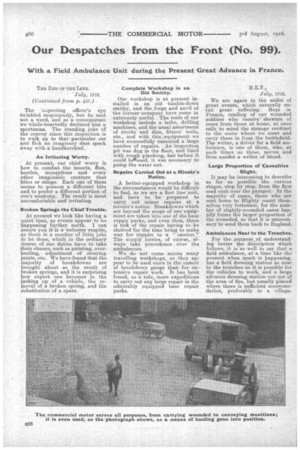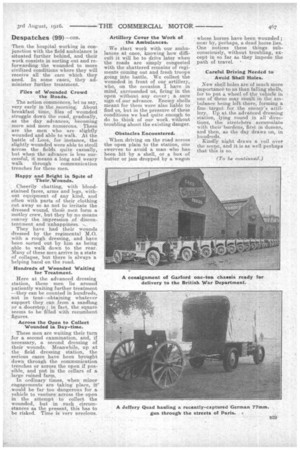Our Despatches from the Front (No. 99).
Page 6

Page 7

If you've noticed an error in this article please click here to report it so we can fix it.
With a Field Ambulance Unit during the Present Great Advance in France.
• TIM END OF THE LINE. " 'july, 1916.. (Continued from p. 457.) The Linpecting officer's eye twinkled suspiciously, but he said not a word, and as a consequence we whole-heartedly declared him a. sportsman. The standing joke of the convoy since this inspection is to walk up to that particular car and flick an imaginary dust speck away with a handkerchief.
An Irritating Worry.
At present., our chief worry is how to combat. the insects, flies, beetles, mosquitoes and every other imaginable creature that bites or stings. Each one of them seems to possess a different bite and to prefer a different portion of one's anatomy. The result is most uncomfortable -and irritating.
Broken Springs the Chief Trouble.
At present we look like having a quiet time, as events appear to be happening further north. I can assure you it is a welcome respite, as there is a number of little jobs to be done, which in the ordinary course of our duties have to take their chance, such as painting, overhauling, adjustment of steering joints, etc. We have found that the majority of breakdowns are brought about as the result of broken springs, and it is surprising bow expert one becomes in the jacking up of a vehicle, the removal of a broken spring, and the substitution of a spare. Complete Workshop in an Old Smithy.
Our workshop is at present installed in an old tumble-down smithy, and the.forge and anvil of the former'occupant have come in extremely useful. The tools of our workshop include a lathe, drilling machines, and the usual assortment of stocks and dies., fitters' tools, etc., and with this..equipment we have successfully executed a large Dumber of repairs. An inspection pit was dug in the floor, and lined with rough planking, but before it could betused, it was necessary to pump the water out.
Repairs Carried Out at a Minute's Notice.
A better-equipped workshop in the circumstances would be difficult to find, as we are a first line unit, and have to be prepared to carry out minor repairs at a minute's notice. Breakdowns which are beyond the scope of our equipment are taken into one of the base repair parks, and even then, there is risk of the repair having to be shelved for the time being to make way for repairs to a camion.” The supply lorries, of course, always take precedence over the ambulances.
We do not come across many travelling workshops, as they appear to be used more in the nature of breakdown gangs than for extensive repair work. It has been found, as a rule, more expeditious to carry out any large repair in the admirably equipped base repair parks. B.E.F.,
July, 1916.
We are again in the midst of great events, which naturally entail great suffering. HeTe in France, reading of our wounded soldiers who receive showers of roses from those at home, at once calls to mind the strange contrast to the scene where we meet and carry them in from the battlefield. The writer, a driver for a field ambulance, is one of those, who, at such times as these, moves and lives -amidst a welter of blood.
Large Proportion of Casualties Slight.
It may be interesting to describe as far as possible the various stages, step by step, from the first mad rush over the parapet. In the majority of cases, those who are sent home to Blighty count themselves very fortinia.te, for the number of slightly-wounded eases happily forms the larger proportion of the wounded, so that it is unnecessary to send them back to England.
Ambulances Near to the Trenches.
For the purpose of understanding better the description which follows, it is as well to say that. a field ambulance, at a. time like the present when much is happening, has a field dressing station as near to the trenches as it is possible for the vehicles to work, and a large advance dressing station not out of the area of fire, but usually placed where there is sufficient accommodation, preferably in a village
Then the hospital working in conjunction with the field ambulance is situated further behind, and their work consists in sorting out and reforwarding the wounded to more civilized conditions where they will receive all the care which they need. In some cases, they administer further treatment.
Files of Wounded Crowd the Roads.
The action commences, Jet us say, very early in the .marning. About breakfast time, files of wounded struggle down the road, gradually, as the day advances, becoming more and more numerous. • These are the men who are slightly wounded and able to walk. At the battle of. Loos, for instance, . the slightly wounded, wore able to stroll across the fields quite casually, but when the advance is less 'successful, it means a long and weary walk through communication trenches for these men.
Happy and Bright in Spite of Their Wounds.
Cheerily chatting, with bloodstained faces, arms and legs, without equipment of any kind, and often with parts of their clothing cut away so as not to irritate the dressed wound, theg-e men form a motley crew, but they by no means convey the impression of discontentment and unhappiness.
They have had their wounds dressed by the regimental M.O. with a rough dressing, and have been sorted out by him as being able to walk down to the rear. Many of these men arrive in a state of collapse, but there is alWays a helping hand on the road.
Hundreds of Wounded Waiting for Treatment.
Here at the advanced dressing station, these men lie around patiently waiting further treatment —they can be counted in hundreds, not in tens—obtaining whatever support they can from a sandbag or a doorstep ; in fact, the square seems to be filled with recumbent figures.
Across the Open to Collect Wounded in Day-time.
These men a-re waiting their turn for a second examination, and, if necessary, a second. dressing of their wounds. Meanwhile, up at the field dressing station, the serious cases have been brought down through the communication trenches or across the open if possible, and put in the cellars of a, large ruined farm.
In ordinary times, when minor engagements are taking place, it would be far too dangerous for a vehicle to venture across the open in the attempt to collect the wounded, but in such circumstances as the present, this has to be risked. Time is very precious. Artillery Cover the Work of the Ambulances.
We Start work with our ambulances at once, knowing how difficult it will be to driYe later when the roads are simply congested with the shattered remains of regiments coming out and fresh troops going into battle. We collect the wounded in front of our artillery, who, on the occasion I have in mind, surrounded us, firing in the open without any. cover ; . a sure sign of our advance. Enemy shells meant for them were also liable to find us, but in the pressure of these conditions we had quite enough to do to think, of our work, without troubling 'about the existing danger.
Obstacles Encountered.
. When driving on the road across the open plain to the station, one swerves to avoid a man who has been hit by a shell,. or a box-of butter or jam dropped by a wagon .
whose horses have-been wounded ; near by,-perhaps, a dead horse lies. One .notices .these things Subconsciously, without troubling, except in so far as they impede the path of travel
Careful Driving Needed to Avoid Shell Holes.
New shell holes are of much more importance to us than falling shells, for to put a wheel of the vehicle in one of these may result in thd ambulance being left there, forming a fine target for the enemy's artillery. Up at the advahced dressing station, lying round in all 'directions, the St•retchers accumulate with their'burdens,. first in dozens, and then, -as the day draws on, in hundreds.
Kin dry night draws a veil over the scene, and it is as well perhaps that this is so.
(To be coneinviil.)




















